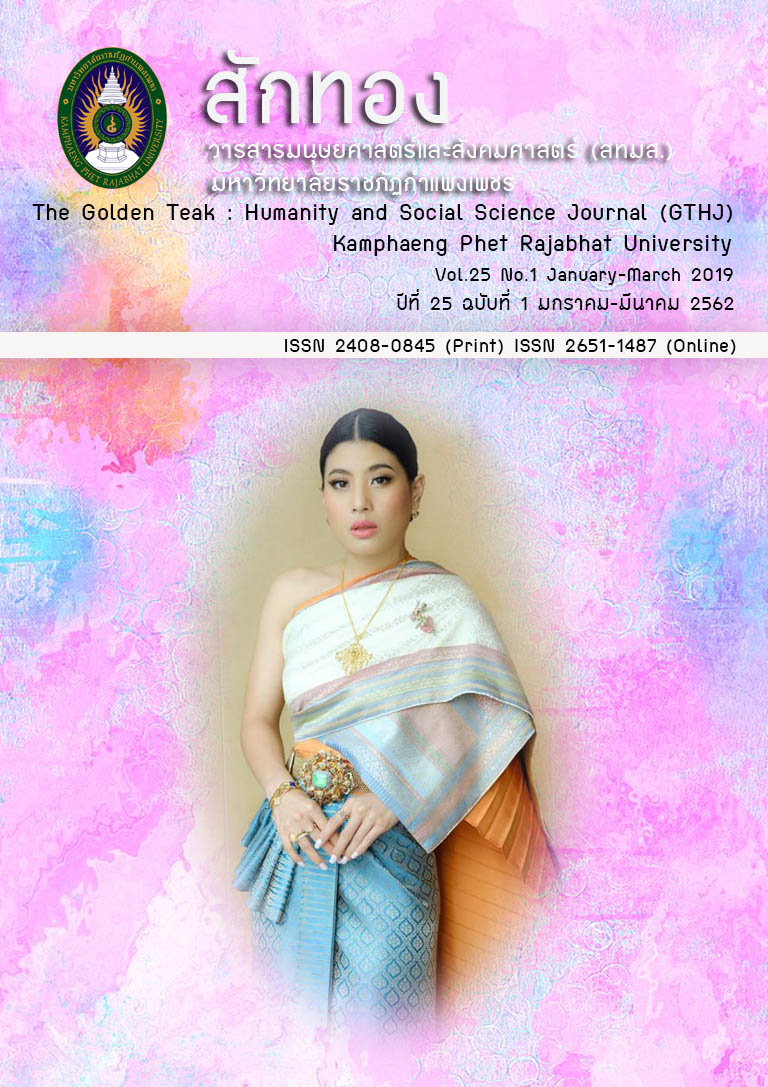Research and Development of Professional Learning Community Management Model of Basic School Teachers to Promote STEM Educational Learning
Main Article Content
Abstract
This research aimed to develop professional learning community management model for basic school teachers to promote STEM educational learning management. Research methodology consisted of 3 steps : 1. Construction the professional learning community management model for basic school teachers to promote STEM educational learning management 2. Utilizing the model and 3. Assessment model. Major sources of data were reviewed literature, and educational personnel including 5 persons from a good practice school, and 80 teachers and school administrators from 20 schools, 5 researchers, 7 educational administrators and supervisors from Educational Area and local government organization in Sukhothai province, and 240 grade 3-9 students. Data collection tools were document analysis form, knowledge and skills of professional learning community and STEM Education management need assessment form, propriety and feasibility of model assessment form, good practice school interviewing form, interviewing form on studying teachers’ knowledge and skills, utility of model assessment form, quality assessment form on learning management plans, students satisfaction form, and lesson study record form.The analysis was conducted through the content analysis and the statistical analysis with the use of frequency, percentage, mean, standard deviation and t-test. Results of this research were as follows: 1) PLC management model was relational pattern of 5 components using PDCA circle to enhance model procedure that comprised of principles, objectives, professional learning community structure, management processes and its results. The model created was at a high level of propriety and feasibility. 2) After utilizing the model, we found that knowledge and skills of professional learning community and STEM Education management after training was higher than before training, and after utilizing the model was higher than after training that it was higher more than 80 percent with .05 significant level. The interview results was consistently found that teachers and school administrators were satisfied with PLC process because they contribute to STEM Education planning and designing active learning activities together. 3) The results from the evaluation of PLC management model was at a high utility level both of in overall and classified by aspect that the model results were effective according to indicators with model management effectiveness in term of outstanding model and manuals, 2 level of PLC team commitment, process management by using PDCA circle. The growth of knowledge and skills of teachers and school administrators was consistent with learning management plan and monitoring results. The Learners’ satisfaction was found to be at a high level after STEM Education learning management.
Article Details
บทความที่ได้รับการตีพิมพ์เป็นลิขสิทธิ์ของวารสาร สักทอง : วารสารมนุษยศาสตร์และสังคมศาสตร์ สถาบันวิจัยและพัฒนา มหาวิทยาลับราชภัฏกำแพงเพชร
ข้อคิดเห็นใดๆ ที่ปรากฎในวารสารเป็นวรรณกรรมของผู้เขียนโดยเฉพาะ ซึ่งมหาวิทยาลัยราชภัฏกำแพงเพชรและบรรณาธิการไม่จำเป็นต้องเห็นด้วย
References
Castetter, W.B. & Young, I.P. (2000). The Human Resource Function in Education Administration. (7 nd ed.). New Jersey : Prentice-Hall.
Deming, Edward W. (1995). Out of The Crisis. USA : The Massachusetts Institute of Technology Center for Advanced Engineering Study.
Husen, T. & Postlethwaite, N.T. (1994). The International Encyclopedia of Education. New York : Pergamon Press.
RoodPuang, J. (2017). Development of a Professional Learning Community Model for Promotion Learning Management, Systems Thinking, and the Construction Innovation Skills of the pre-service teacher. Veridian E-Journal, Silpakorn University,10(1), 281-296.
Intanam, N. (2010). Development of the Core for the Creation of a Professional Learning Community in Schools. Thesis, Chulalongkorn University.
Williams, N. & Chatrupracheewin, C. (2017). The Development of the Internal Supervision by Professional Learning Community Building in the Primary School Under the Office of Basic Education Commission. The Golden Teak : Humanity and Social Science Journal (GTHJ.) 23(2), 112-128.
Chanchaluen, N. (2002). Internal Systematic Supervision for the Development of Professional Teachers of Ban Wangsan School Amphur Bang Krathum
Phitsanulok Province. Thesis, Naresuan University.
Office of the Education Council. (2016). Research Report to Propose Policy for Promotion of STEM Education in Thailand. Bangkok : prigwhan Graphic Co., Ltd.
Office of the Education Council. (2017). National Education Program, 2017-2022. Bangkok : prigwhan Graphic Co., Ltd
Nampan, P., Khruein, N. & Khruein, C. (2014). The Science of Learning Management Model namely Materials and Properties of Materials by using STEM Education of Prathom Suksa 5 students. National Conference on Educational Research 1st. Faculty of Education. Pattani Campus, 29-30 May 2014, at Hat Yai Songkhla, Songkhla Province.
Quinn, R.E. (1996). Becoming a master manager : A Competency Framework. New York : John Wiley and sons.
Jitaree, R., Uaiy, V. & Keawurai, W. (2018). The Development of Instruction Model based on Constructivist Learning Theory and STEM Education Approach to Enhance Analysis Thinking and Scientific Literacy for Matayomsuksa 1 Students. Journal of Education Naresuan University, 19(2), 202-213.
Phatharakundutsadee, R. (2018). A Study of the Problems of Teaching and Learning in STEM Education by the PLC (Professional Learning Community) Process in Schools under the Office of Nan Primary Education Service Area 1. Nan : The Office of Nan Primary Educational Service Area 1.
Sergiovanni, T. (1998). Building Community in Schools. San Francisco. CA : Jossey Bass.
Kasemsin, S. (1983). New Personnel Management. (5 th ed.). Bangkok : Thai Wattana Panich.
Panich, V. (2012). The 21st Century for Learning in the 21st Century. Bangkok : Tatata Publication.
Warayu, V. & Kornpuang, A. (2017). The Development of Professional Community of Donmoon School (Suwannasarajbamrung) by Using Benchmarking with Lamplaimatpattana School. Journal of Education Naresuan University, 19(4), 239-252.

